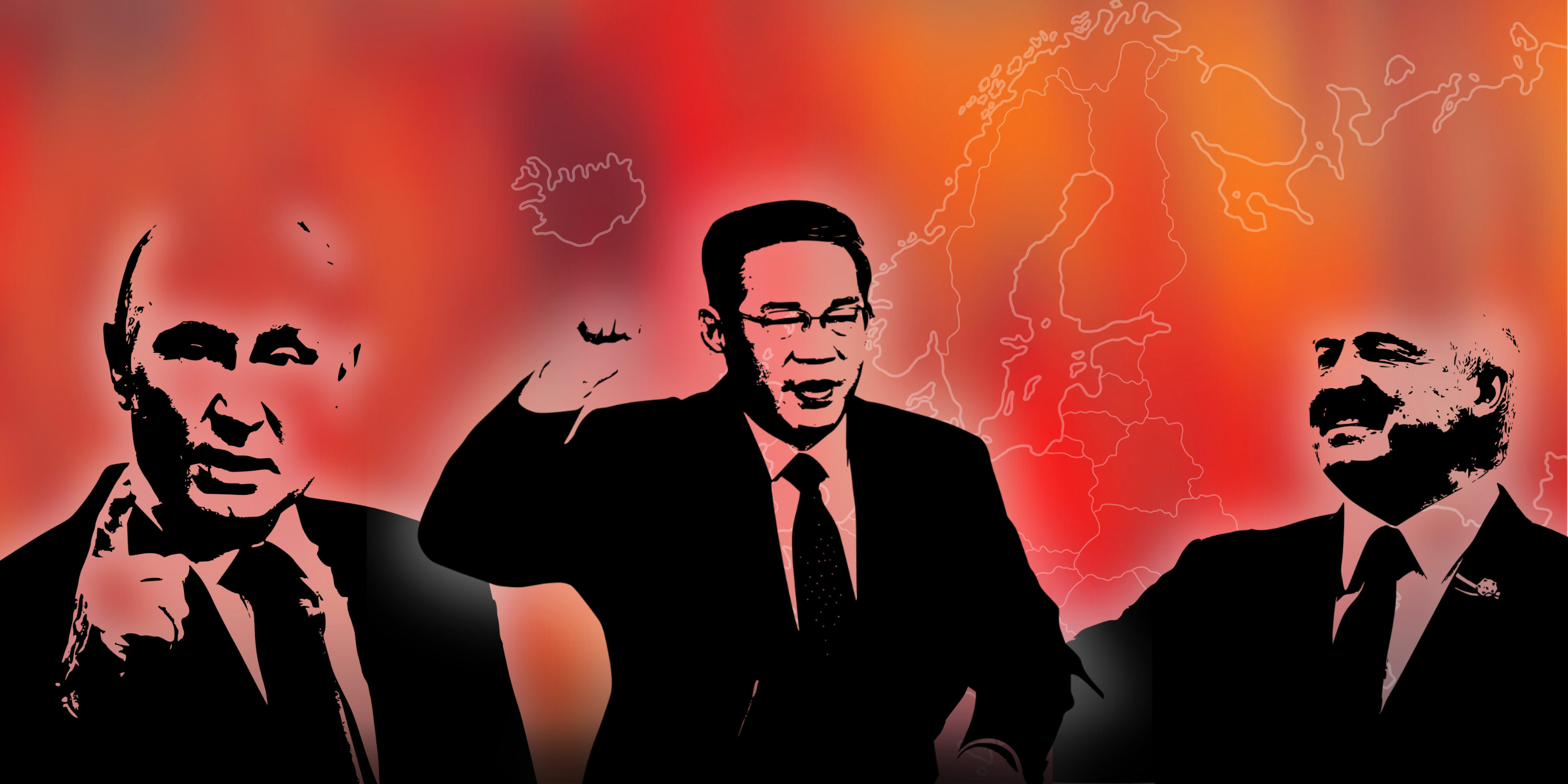Chinese state media depicts Russia as an equal major power that shares China’s goals to reshape the Western-dominated global order, and Belarus as a minor partner seeking to benefit from China’s experience with its authoritarian development model.
-
Chinese Premier Li Qiang’s visits to Russia and its close ally Belarus showcase Beijing’s intentions to build a zone of influence on the Eastern borders of the EU and NATO.
-
During the Moscow visit, the signing of bilateral deals and the integration of Russia into Beijing’s multilateral initiatives, the BRICS and the Shanghai Cooperation Organization (SCO), were at the forefront.
-
The government of Belarus also signed a number of economic and tech-related agreements with Beijing, expecting to learn from “Chinese-style modernization”.
Between August 20th and 23rd, China’s second-highest ranking official, Premier Li Qiang, visited Russia and Belarus, resulting in bilateral joint communiqués on cooperation with both countries. In Moscow and Minsk, Li was welcomed by the two nations’ top leaders, Russian President Vladimir Putin and Belarusian President Alexander Lukashenko, underscoring the importance of Chinese ties for these two governments.
Chinese media referred to the Moscow meeting as the “29th Regular Meeting Between Chinese and Russian Heads of Government”. Emphasizing “regularity” is an important talking point for Beijing, which insists that it merely maintains “normal bilateral relations” with Moscow without “targeting any third parties”. However, the overtly positive official presentation of Li’s Moscow visit and the numerous joint statements and agreements suggest that Moscow holds a more prominent position among Beijing’s partners. Beyond securing access to Russia’s cheap energy, Li’s agenda also included the enhancement of cooperation under joint multilateral institutions, most notably BRICS and the Shanghai Cooperation Organization (SCO).
Premier Li continued his European journey with a visit to Moscow’s close ally Belarus, which recently became the first fully European country to join the SCO and, in July, to hold joint military drills with China’s People’s Liberation Army. Sanctioned by the West for its involvement in Russia’s war of aggression against Ukraine, Lukashenko’s government appears eager to welcome more Chinese economic and political influence, as indicated by the joint communiqué issued during Li’s visit.
State media praises Moscow’s pivoting towards Beijing
In Moscow, Premier Li and his Russian counterpart, Mikhail Mishustin, signed a document titled the “Joint Communiqué of the 29th Regular Meeting of the Chinese and Russian Prime Ministers”, consisting of nine chapters. The document begins by pledging to uphold the principles of the UN Charter while also criticizing “some countries” for their hegemonic pursuits, despite the official Chinese narrative of “not targeting any third parties” in its bilateral relations with Moscow. Russia’s war of aggression against Ukraine is notably absent from the document, despite the aforementioned pledge to uphold the UN Charter as a guideline for international relations.
The joint communiqué outlines a diverse set of areas in which the two sides agreed to enhance cooperation, including Arctic affairs, education, personnel training in information and cooperation technology, AI, satellite navigation systems, banking and investment, anti-terrorism, anti-money laundering, and energy. The two sides also pledged to organize joint cultural events as part of the 2024-25 edition of “Years of Russian and Chinese Culture”.
The final chapter of the joint communiqué lists 17 documents signed during Li’s visit, the most prominent one being the “Outline of the Program of Investment Cooperation between Russia and China”. Other documents include memoranda of understanding (MoUs) and protocols on cooperation in energy, transport, basic research, and regional-level engagement.
Notably, the original Chinese text mentions “BRICS“ 19 times and “Shanghai Cooperation” 13 times, mostly in the context of enhancing China-Russia cooperation within these non-Western multilateral frameworks. It thus highlights Beijing’s and Moscow’s shared intention to reshape global governance through joint efforts.
Accordingly, Chinese state media reports on Li’s visit praised China-Russia cooperation as an important factor in creating a more multipolar global order. A report by state-owned People’s Daily Online, which attracted more than 100,000 readers on WeChat as of August 29, lauded the strategic leadership of Chinese President Xi Jinping and his Russian counterpart Vladimir Putin as the guiding force behind bilateral relations in the “New Era” and the new vitality of China-Russia relations.
A report by Xinhua, shared on China’s Central People’s Government’s website, described stable China-Russia relations as vital for maintaining global peace in an era of “major changes unseen in a century”. The report also claimed that the continued development of China-Russia relations would “advance multipolarity and globalization” and safeguard “the basic norms of international relations.”
An article by state-owned Global Times Online described the visit as “strengthening all-round practical exchanges” between the two sides, achieving “a number of results”. It quoted Russian Prime Minister Mishustin: “Our external situation is very difficult now, but as our Chinese friends say, ‘a just cause enjoys abundant support’ (得道者多助).” The article also cited Mishustin and a researcher from Russia’s Institute of World Economy and International Relations emphasizing the importance of building a multipolar global order.
Guancha Online provided a more detailed analysis of the outcomes of Li’s visit, including the opinions of various experts. According to Liu Jun, executive director of the Center for Russian Studies, East China Normal University, the latest “joint communiqué” largely continued previous agreements, with some new breakthroughs and substantive elements. Liu pointed out that many Chinese companies are hesitant to invest in Russia due to the ongoing “Russia-Ukraine conflict” and Western sanctions.
Russia, according to Liu, hopes to see more Chinese investments following the signing of the “Outline of the Program of Investment Cooperation between Russia and China.” Xu Poling, Director of the Institute of Russian Economy at the Chinese Academy of Social Sciences, highlighted that the major breakthrough of the meeting was the signing of the “Outline” document. Xu noted that Chinese investment in Russia has faced significant challenges due to Russia’s complex legal system, which has slowed the pace of implementing Chinese investment projects. Therefore, the “Outline” represents a significant step forward. Xu also referenced Russia’s Minister of Economic Development, Maxim G. Reshetnikov, who mentioned that the Russian-Chinese Investment Cooperation Committee, convened for the 11th time during Li’s latest visit, listed 86 major bilateral investment projects to be realized, with a total value of 18 trillion rubles (about 1.4 trillion yuan), equivalent to approximately $196 billion.
Belarus set to learn from “Chinese modernization”
During Premier Li’s visit to Minsk, he and his Belarusian counterpart, Prime Minister Roman A. Golovchenko, also issued a joint communiqué. Unlike the document inked in Moscow, which maintained a narrative of equality between the two sides, the Minsk communiqué made it clear that Belarus views China as a model for its own development.
The China-Belarus communiqué, published on the Chinese Central People’s Government’s website, emphasized cooperation in science and technology, with Belarus eager to benefit from this partnership. The document sets 2030 as the target year for achieving the mid-term goals of cooperation between the two sides, pledging “to share the experience and results of China’s modernization and to collaborate in the development of new quality productive forces”. 2024 and 2025 were also declared as the years of “science and tech innovation”, highlighting cooperation projects to be realized between the two sides. Moreover, the communiqué mentioned that the two sides “will engage in mutually beneficial cooperation in the fields of information and communications technology”, including AI, cyber and data security, professional education, and scientific research work in the industry.
The communiqué also reflected agreement between the two sides on matters of global order and international relations, pledging to uphold the international order based on CCP-promoted initiatives such as the “Community of Common Destiny for Mankind” and the “Global Civilization Initiative.” The communiqué briefly mentioned the importance of dialogue for the peaceful resolution of conflicts, likely referencing the Russia-Ukraine war. In the context of cultural cooperation, the document highlighted “promoting the correct view of World War II victory,” a reference to the upcoming 80th anniversary of the Allied victory in 2025.
The communiqué further suggests that Beijing is actively working to integrate Belarus into its multilateral initiatives such as the Belt and Road Initiative (BRI), BRICS, and the SCO. Belarus, which earlier this year became the first fully European member of the SCO, is set to host the Belarusian Synergy Center of the China-SCO Technology Transfer Center. The two sides also pledged “to make concerted efforts to promote the further development and growth of the Shanghai Cooperation Organization as an authoritative and influential multilateral mechanism.” The final section of the communiqué mentions that the two sides signed cooperation documents on the Belt and Road Initiative, economy and trade, science and technology, industry, and education, though details were not provided.
The communiqué, shared by China Government Online on WeChat, had more than 100,000 readers on the platform as of August 29th. A popular article by People’s Daily Online reported on Li’s meeting with Belarusian President Lukashenko and noted that both sides agreed on several principles regarding the importance of multipolarizing the international order and promoting the interests of developing countries (though it did not clarify whether Belarus is considered a “developing country”).
Lukashenko was also quoted as praising Xi’s global initiatives and Beijing’s “selfless” support for Belarus, despite his absence from the last Belt & Road Forum in 2023, which was attended by other Beijing-friendly European leaders such as Putin, Hungarian Prime Minister Viktor Orbán, and Serbian President Aleksandar Vučić. According to an analysis by the Warsaw-based NGO “Belarus in Focus,” Lukashenko’s absence from the Forum was unsurprising, as Beijing had lost interest in Belarus as a logistics hub for the BRI due to EU sanctions. Nevertheless, the joint communiqué issued during Premier Li’s Minsk visit suggests that Beijing remains interested in advancing its strategic partnership with Minsk, particularly within the SCO framework.
Building a pro-Beijing club of autocrats on the EU’s eastern borders
The tone of reporting on the two visits in the Chinese media differs in interesting ways. Russia is portrayed as an equal major power that shares China’s goals to reshape the Western-dominated global order, while Belarus is depicted as a minor partner seeking to benefit from China’s experience with its authoritarian development model.
Despite these differences, there are common themes in the narratives surrounding the two visits, particularly the CCP’s desire to position itself as the leader of an alternative order that includes autocratic regimes sanctioned by the West. The “multipolarization” of the global order is a central theme in reports on both the Moscow and Minsk visits. The enhancement of cooperation with Russia and Belarus under non-Western multilateral institutions, particularly BRICS and the SCO, appears to have been the primary objective of Li’s visits, according to the joint communiqués and Chinese media reports.
Since both countries share long borders with EU and NATO member states and are actively involved in the ongoing Russia-Ukraine war, Western leaders must closely monitor how Beijing cultivates its relations with them. The impact of Beijing’s increasing presence along the EU and NATO’s Eastern borders on Europe’s security architecture will be of critical importance moving forward.







